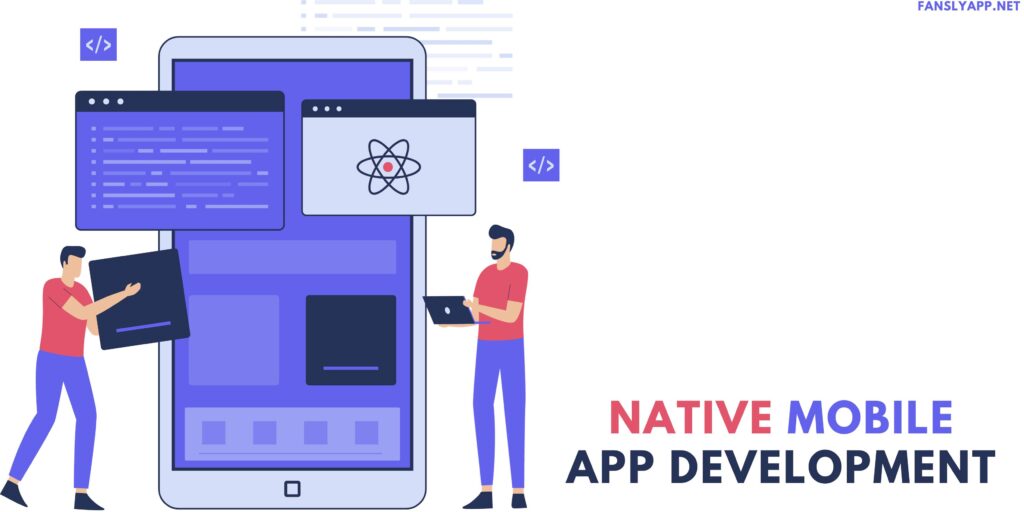
The ever-expanding realm of native mobile app development has become a perplexing, yet captivating industry, as businesses across the globe gradually comprehend the dire need to establish their presence on portable devices. Crafting native mobile applications entails meticulously tailoring them to fit a specific operating system, be it iOS or Android. This approach presents an array of alluring advantages, including unrestricted access to an extensive repertoire of device functionalities and features, unrivaled performance benchmarks that transcend mediocrity, and fortified security systems.
Undeniably, one of the paramount perks associated with native mobile app development is its unparalleled capacity to harness the power of indigenous APIs and frameworks. By adroitly employing tools and libraries inherently provided by each respective operating system, developers possess the rare ability to seamlessly integrate their creations with an assortment of enthralling attributes such as cameras that capture fleeting moments in exquisite detail; GPS capabilities that guide users through uncharted territories; push notifications that instantaneously relay vital information; among countless others. In comparison to alternative types of applications, those developed natively often exhibit commendable performance metrics due to their unwavering dedication towards catering exclusively to a particular platform’s idiosyncrasies.
These apps are diligently fine-tuned so as to fully capitalize on both hardware marvels and software intricacies within each device they inhabit, resulting in swifter loading times and remarkably fluid user experiences. Furthermore, embarking upon this path paves the way for augmented security measures by virtue of these apps embracing innate safeguards offered by their host operating systems, a fortification strategy integral in minimizing data breaches or unauthorized encroachments into sensitive realms.
Understanding the Pros and Cons of Native Mobile App Development

The decision to embark on the journey of native mobile app development presents itself with a labyrinthine maze of advantages and disadvantages that necessitate meticulous contemplation. At the forefront stands the remarkable advantage of unleashing the full potential bestowed upon us by the device’s myriad features and capabilities. These native apps are meticulously crafted exclusively for specific platforms, be it iOS or Android, thereby allowing them to tap into every nook and cranny offered by the operating system’s hardware and software functionalities. The result? An immersive user experience enriched with seamless integration of GPS, camera, microphone, push notifications, and other enticing elements.
However, lurking in the shadows lies one harrowing drawback: time constraints coupled with exorbitant expenses. Creating an individualized app for each platform engulfs developers in a whirlwind of hours upon hours dedicated to honing their expertise in each operating system’s unique realm. Furthermore, this development process entails comprehensive testing and rigorous debugging specifically tailored for each platform, a task that contributes significantly to both overall temporal expenditure as well as financial outlay. Let us not forget about maintaining multiple versions of said app, an endeavor that is nothing short of herculean, on top of struggling through countless updates that demand valuable time from our devoted developers.
Yet despite these formidable challenges lying in wait at every turn along this arduous path towards native mobile app development, the allure remains irresistible. The undeniable benefits far outweigh any obstacles encountered along this enthralling journey, making it an undeniably popular choice amongst businesses and organizations yearning to present their users with an awe-inspiring application experience, one packed to bursting point with flawless performance and captivating features.
Exploring the Advantages of Developing Native Mobile Apps

Native Mobile App Development brings forth a plethora of advantages, leaving one perplexed by the sheer magnitude of benefits. Among these advantages lies the pinnacle of superiority in performance that native apps graciously offer. These marvels of technology are meticulously crafted and tailored for specific platforms like iOS or Android, enabling them to harness the full potential hidden within a device’s hardware and software capabilities. The result is an unparalleled experience marked by lightning-fast loading times, seamlessly fluid animations, and an overall user interaction that transcends mere satisfaction.
But wait! There’s more! Native apps unlock access to an expansive array of features and functionalities not easily attainable through web or hybrid counterparts. This grants developers the power to create applications that possess unwavering robustness and unrivaled richness in their offerings. It is at this intersection where possibilities burst forth like fireworks on a starry night.
Yet another advantage bestowed upon those who embark on the path of native mobile app development lies in their ability to tap into the very essence of a device’s existence – its native APIs and libraries. Like master magicians conjuring spells from ancient grimoires, developers can effortlessly weave together powerful elements such as GPS tracking, camera integration, contact management, and push notifications into their creations with seamless ease. Such captivating feats elevate user experiences beyond imagination as they delve deep into personalized realms previously unexplored.
In conclusion, dear reader, venture forth into the realm of developing native mobile apps armed with knowledge about these awe-inspiring advantages that await you there. Embark on this journey filled with perplexity yet bursting with untapped potential waiting to be unleashed upon smartphone screens worldwide!
What does native mobile app development entail?
Native mobile app development encompasses the intricate process of crafting mobile applications specifically tailored for a particular operating system, be it iOS or Android. This is achieved through the utilization of programming languages and frameworks that are indigenous to that specific platform.
What advantages does native mobile app development offer?
The realm of developing native mobile apps presents an array of advantages, including unparalleled performance, unfettered access to device-specific features and functionalities, an enhanced user experience, offline capabilities, and heightened security measures.
How does native mobile app development excel in terms of performance?
Native apps are constructed utilizing platform-specific languages such as Swift or Objective-C for iOS and Java or Kotlin for Android. This grants them direct access to the hardware and software resources intrinsic to the device itself. Consequently, this culminates in swifter load times, seamless animations, and an overall superior performance compared to hybrid or web-based counterparts.
How does native mobile app development enhance user experience?
Native apps are painstakingly crafted taking into account the distinct guidelines and design principles inherent within each platform they cater towards. Thus ensuring a more intuitive interface that users find familiar due to its adherence with their devices’ established norms. Furthermore, the optimization in terms of performance alongside unrestricted access granted by these applications serve as catalysts for delivering smoother interactions resulting in highly engaging experiences overall.
Do native mobile apps provide offline capabilities?
Indeed! Native apps boast built-in functionalities that facilitate the storage of data directly on the user’s device. Thus enabling users to access certain features and content without being dependent upon an active internet connection. This attribute proves invaluable for apps reliant on seamless data synchronization or those requiring offline capabilities.
Are native mobile apps more secure compared to other types?
Native apps reap the benefits derived from operating system providers’ robust security measures. These applications are afforded access to secure APIs and undergo regular security updates, thereby bolstering their resistance against potential threats.